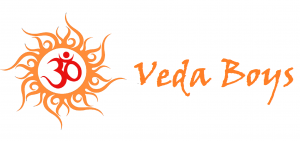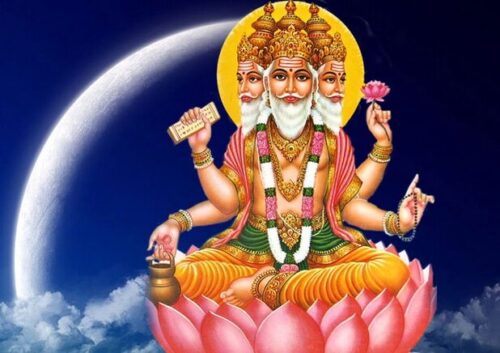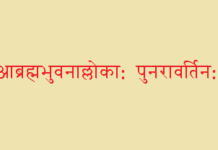Manas Putra (मानसपुत्र)
Manas Putra (मनसि भवो जातो वा) – sons born using the mind or will .
The name and number of sons are different as per the different scriptures. According to Srimad Bhagavat Purana, Rudra (रुद्र) were born from Lord Brahma who are eleven in number.
Before the birth of Manu and Shatrupa, sex as a medium of producing offsprings was not known, therefore the sons were born at will ( तदा मिथुनधर्मेण प्रजा ह्येधाम्बभूविरे)
Manas Putra of Brahma
सनकं च सनन्दं च सनातनमथात्मभू: ।
सनत्कुमारं च मुनीन्निष्क्रियानूर्ध्वरेतस: – Srimad BhagavatPuran 3.12.4
Brahma created four great sages named Sanaka, Sananda, Sanatana and Sanat-kumara. All of them were unwilling to adopt materialistic activities because they were highly held intelligence.
मरीचिरत्र्याङ्गिरसौ पुलस्त्य: पुलह: क्रतु: ।
भृगुर्वसिष्ठो दक्षश्च दशमस्तत्र नारद: – Srimad BhagavatPuran 3.12.22
Marichi (मरीचि:), Atri (अत्रि:), Angira (अङ्गिरा:), Pulastya (पुलस्त्य:), Pulaha (पुलह:), Kratu (क्रतु:), Bhṛgu (भृगु:), Vasiṣṭha (वसिष्ठ:), Dakṣa (दक्ष:), and the tenth son, Narada (नारद:), were thus born.
उत्सङ्गान्नारदो जज्ञे दक्षोऽङ्गुष्ठात्स्वयम्भुव: ।
प्राणाद्वसिष्ठ: सञ्जातो भृगुस्त्वचि करात्क्रतु: ॥ – Srimad BhagavatPuran 3.12.23
Narada (नारद:) was born from the deliberation of Brahma, which is the best part of the body. Vasistha (वसिष्ठ:) was born from his breathing, Dakṣa (दक्ष:) from a thumb, Bhṛgu (भृगु:) from his touch, and Kratu (क्रतु:) from his hand.
पुलहो नाभितो जज्ञे पुलस्त्य: कर्णयोऋर्षि: ।
अङ्गिरा मुखतोऽक्ष्णोऽत्रिर्मरीचिर्मनसोऽभवत् ॥ – Srimad BhagavatPuran 3.12.24
Pulastya (पुलस्त्य:) was generated from the ears, Aṅgirā (अङ्गिरा:) from the mouth, Atri (अत्रि:) from the eyes, Marīci (मरीचि:) from the mind and Pulaha (पुलह:) from the navel of Brahmā.
धर्म: स्तनाद्दक्षिणतो यत्र नारायण: स्वयम् ।
अधर्म पृष्ठतो यस्मान्मृत्युर्लोकभयङ्कर: ॥ – Srimad BhagavatPuran 3.12.25
Religion (धर्म:) was manifested from the chest of Brahmā, wherein is seated the Supreme Personality of Godhead Nārāyaṇa, and irreligion (अधर्म:) appeared from his back, where horrible death takes place for the living entity.
हृदि कामो भ्रुव: क्रोधो लोभश्चाधरदच्छदात् ।
आस्याद्वाक्सिन्धवो मेढ्रान्निऋर्ति: पायोरघाश्रय: ॥ – Srimad BhagavatPuran 3.12.26
Desire (काम:) became manifested from the heart of Brahmā, anger (क्रोध:) from between his eyebrows, greed (लोभ:) from between his lips, Speech (वाक्) from his mouth, the ocean (सिन्धु:) from his penis, and from his anus, the caretaker of all sins (निऋर्ति:).
छायाया: कर्दमो जज्ञे देवहूत्या: पति: प्रभु: ।
मनसो देहतश्चेदं जज्ञे विश्वकृतो जगत् ॥ – Srimad BhagavatPuran 3.12.27
Sage Kardama (कर्दम:), husband of the great Devahuti, was manifested from the shadow of Brahma. Thus all became manifested from either the body or the mind of Brahma.
यस्तु तत्र पुमान् सोऽभून्मनु: स्वायम्भुव: स्वराट् ।
स्त्री याऽसीच्छतरूपाख्या महिष्यस्य महात्मन: ॥ – Srimad BhagavatPuran 3.12.51
Out of them, the male form became known as the Manu (मनु:) named Svāyambhuva (स्वायम्भुव:), and the female became known as Śatarūpā (शतरूपा:), the queen of the great soul Manu.



















